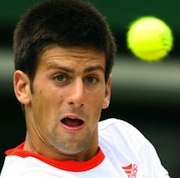 “Physically, there is not much difference between No. 78 in the world and Nos. 2, 3, 1, and 5,” said Novak Djokovic, the top-ranked men’s tennis player. “It’s a mental ability to handle the pressure, to play well at the right moments.”
“Physically, there is not much difference between No. 78 in the world and Nos. 2, 3, 1, and 5,” said Novak Djokovic, the top-ranked men’s tennis player. “It’s a mental ability to handle the pressure, to play well at the right moments.”
According to Rafael Nadal, U.S. Open 2010 winner and holder of the #1 ranking for 102 weeks and #2 for 190 weeks, “If you watch the No. 10 player in the world and the No. 500 in training, you won’t necessarily be able to tell who is higher up in the rankings. Without the pressure of competition, they’ll move and hit the ball much the same way.”
So, if mental focus, mental toughness, is the key to the highest level of success, how do you become, as then unranked 2008 Australian Open finalist Jo-Wilfried Tsonga put it, “really, really strong in the head”? (The New York Times, September 7, “In a Game of Physical Prowess, It’s the Mind That Matters,” by Karen Crouse.)
First, a strong head consists of 2 primary attributes
– the ability to clear one’s mind of negatives: doubt, worry, and fear
– the ability to fill one’s mind with confidence, belief, self-assurance, the talent to remain cool, calm, collected, and centered, even while under extreme stress
Second, quite frankly, you hone mental abilities pretty much the same way you hone physical abilities: practice, effort, and experience. Quoting Tsonga again: “My game, you know, is very good when I have nothing in my head, when I just play my game.” Yet stilling the mind’s “monkey chatter,” learning to silence and empty the mind, takes disciplined practice, focused practice, directed and coached practice. Visualization and mediation are two common mental techniques to hone powers of focus and concentration.
And once the mind is emptied of doubt, fear, and distraction, it must be filled with a solid foundation of belief and confidence. Belief that there always is a way, that someone, somewhere, sometime is going to beat the odds. Why not me, why not now? We never attempt that which we believe to be impossible.
Closing quotes:
“Never mind the odds against you. If you doubled your effort, what would the odds against you do—send for reinforcements?” — Robert Brault
“Our doubts are traitors, and make us lose the good we oft might win, by fearing to attempt.” — William Shakespeare; 1564- 1616. “Measure for Measure,” Act 1 Scene 4, Lucio speaking
“If you can keep your head when all about you
Are losing theirs and blaming it on you;
If you can trust yourself when all men doubt you,
But make allowance for their doubting too”
— “If,” Rudyard Kipling


0 Comments